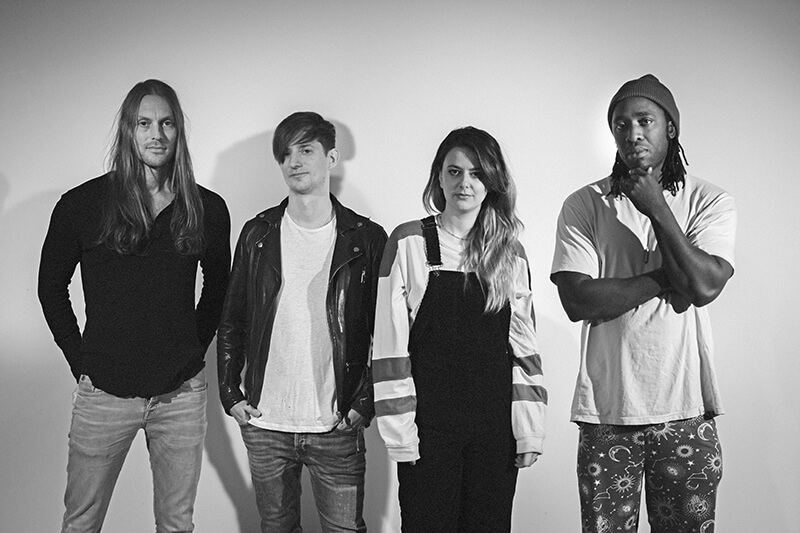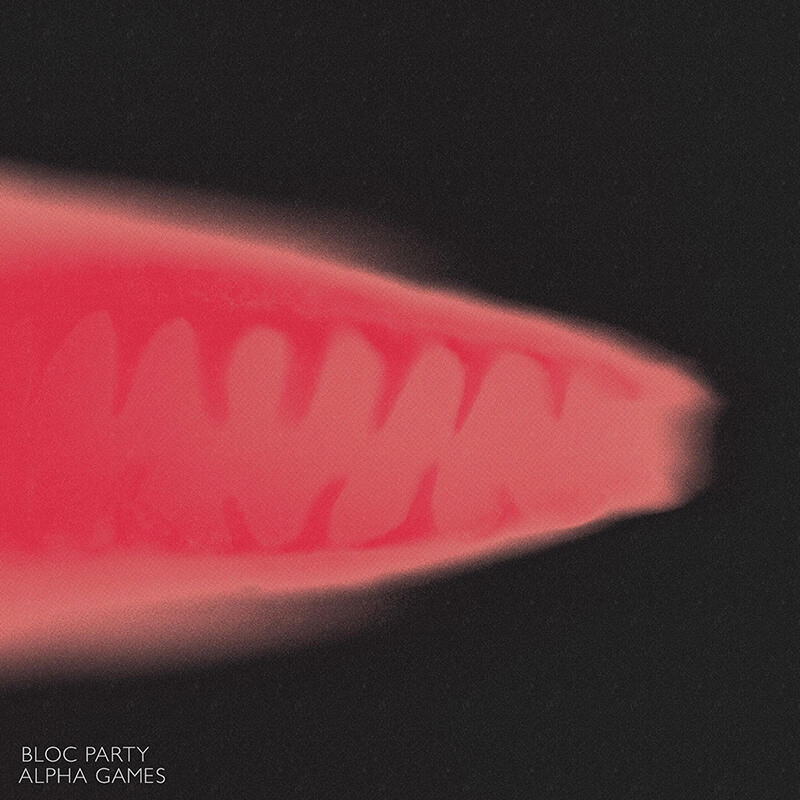Bloc Party had been in a retrospective mood as 2020 approached. By December 2019, the illustrious indie group had finished their Silent Alarm tour, which paid homage to their debut and fan-favorite record released in 2005 by playing the album in full, front-to-back.
After reflecting on the songs that first shot Bloc Party into the fandom ether more than 15 years ago, it would have been understandable to press pause and take a breath. But lead singer Kele Okereke had balanced out that retrospection with an eagerness for the future: he and the rest of Bloc Party began writing new songs in 2018, and by the end of the Silent Alarm tour, Okereke was mentally preparing to lay the tracks down and release the band’s sixth album.
“We were ready to make this record Alpha Games at the end of 2019,” Okereke says. “This record was ready to go two years ago.”
And then—well, you know the rest.
Now in 2022, it’s difficult not to place everything in the context of the pandemic. For many artists, lockdowns forced a period of introspective creativity, and today we’re beginning to see the fruits of that often-painful labor.
Yet for Okereke, the struggle during lockdown wasn’t about creating. Rather, it was a challenge to allow what he had already created to remain as is, and a lesson in knowing himself as an artist—both his strengths and weaknesses.
https://youtu.be/YCJXd_DVnEc
“My big fear in taking an extended break from the music was that, knowing how I operate, I felt I would want to keep tweaking things and changing things,” Okereke says about having to sit idle by the new tracks while the virus waged its war. “You want the media to represent where you’re at right now, and I felt that if we’re sitting on it for a year, I might start to think it needed to feel a little bit different. I was adamant, just knowing who I am, I had to safeguard to make sure we didn’t do that.”
He adds, “To second-guess ourselves and take it somewhere else, it felt like that would have been a slightly dangerous thing.”
Instead, Okereke dove into solo work to keep his hands busy, releasing The Waves Pt. 1 in May of 2021. For Bloc Party, the result of this self-restraint is 12 tracks of promiscuous, ethereal, glamorous rock that wavers between indie, metal, and electronic, a balance for which Bloc Party has developed a reputation over the years.
Coming off the high of their Silent Alarm tour, Okereke felt a desire to create a record built to feed off the energy of a crowd. It was a diversion from the previous record, Hymns (2016), which Okereke says was written on the foundation of studio machinery. That album allowed Bloc Party to experiment with new sounds and engineer ideas with precision.
“They were studio creations that we then had to work out to perform live,” he says. “After touring the Silent Alarm shows, we were reminded of the energy and the intensity that we could create and conjure up between the four of us, just on a stage in a room.”
The band made the conscious decision to write Alpha Games in the same fashion.
“That should be the center of this record: the sound of us playing together,” Okereke adds.
Undoubtedly that approach will bode well when Bloc Party begin the tour circuit again, and there are a few standout songs the lyricist says he’s particularly excited to perform live.
There’s “Sex Magik,” the record’s third single with the energy of an underground warehouse party thanks to a glam-rock, space-age electronic beat, and “Day Drinker,” the album’s first track that meshes David Bowie musical flare with the band’s signature hi-hats and heavy guitar riffs.

Okereke also highlights “Rough Justice,” an adventurous synth-heavy track that brings the singer’s theatrical flair for Sprechgesang, that vocal space between speaking and singing, to center stage. The song seems to embody the sound into which Bloc Party have evolved with Alpha Games: sexy and dangerous, yet glamorous and fun.
That’s the mood for other standout songs on the record, like “The Girls Are Fighting,” which Bloc Party released as the album’s second single back in January. The track recounts a late night at the bar and the explosion of a fight that breaks out between two women.
This jealous lovers’ quarrel is something Okereke says is “something that will never stop to amaze me and stop me in my tracks: that moment when a switch is flicked in someone’s brain, and they start putting hands on other people.”
It’s a scene he describes as “very frightening, but also very intoxicating.” Bloc Party amplifies the paradox with the track’s music video, which depicts an empowering boxing match between two women instead of the petty catfight the song describes.
“There is a slight dissonance between the lyrical perspective and how the video is,” acknowledges Okereke, who says that in 2022, it wouldn’t seem right to portray visually the kind of scene the lyrics describe. Rather, he wanted the video to reflect female aggression and athleticism. “I didn’t want it to feel like that Duran Duran video for ‘Girls on Film.’ It wasn’t about being an erotic moment at all. That’s what’s I’m really proud about with the video, that it was showing women in positions of strength.”
Kele denies that the song was written as a sort of feminist anthem, but with lyrics like, “The girls are fighting / and the boys can’t cope,” it’s difficult to deny such an interpretation. The dissonance between the lyrics and the video may not be as pronounced as Kele thinks after all.
Regardless of its message, “The Girls Are Fighting” certainly mirrors the overarching theme on the record of “people locked in dual,” as Okereke describes it, highlighting dreamy track “You Should Know the Truth” and the shadowy monologue of “The Peace Offering” as other songs that fit this bill.
“If I’m being frank, I have no need for your scented candles,” sings Okereke on “The Peace Offering,” the final track on Alpha Games. “I don’t need your peace offering. I’d rather have the money you spent, if I’m being frank.”
That frankness is part of what first captured fans’ hearts with Okereke and Bloc Party in the mid-2000s. Unpretentious lyrics like “I’ll pay for you anytime” on Silent Alarm’s “This Modern Love” showcased Okereke’s ability to catch many off-guard and hit a nerve with simplicity.
If his lyrics are frank, it’s Okereke’s compositions that bring sophistication and complexity to Bloc Party’s sounds, resulting in more paradoxical harmony: “If We Get Caught” is sweet and low, “Callum is a Snake” houses Okereke’s impressive vocal range with more theatrical song-speak, and “Traps” – the album’s first single released before the new year – sits within the space of provocative hard rock.
Collectively, Alpha Games is the sound of 2019 Bloc Party jamming in a room, ready for a crowd. The next album, on the other hand, probably won’t follow suit, and in true Okereke fashion, he’s already looking ahead.
“I’ll bet my bottom dollar that the next thing we do will be a step away,” Okereke says. “But I think that constant veering, like a pendulum, that constant varying between extremes is a good way to work because it means that everything feels exciting.”

That energy is what Okereke says has kept him going over the years, through murmurs of conflict within Bloc Party, breakup rumors, a hiatus, and lineup changes – not to mention the external turmoil of terrorist attacks, the pandemic, and now, more war. Six Bloc Party albums, five solo albums, and a musical later, Okereke finds that what grounds him is keeping his hands busy with creation and focusing on the gratitude he feels for being able to build a life for himself as an artist.
“I’ll always be creative,” he says. “Will I always be in Bloc Party? I don’t know, I can’t answer that question. But I know the joy of pulling ideas and moments and songs. I know what that does for me, and I just can’t imagine I’d ever not have that in my life in some capacity. With all the turbulence in the world, that’s even more of a reason not to quit,” Okereke adds. “That’s even more of a reason to carry on, because it calms me down. It gives me a sense of purpose in a world that doesn’t seem to have much purpose right now.”
Photos by Wunmi
